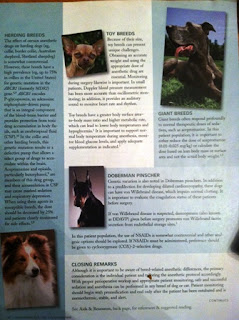I thought it might be a good time to discuss a recent article that pertains to an issue I know many pet parents worry about. Anesthesia.
Every so often I see a pet who still isn’t spayed or neutered. Many of these pets have developed problems because they haven’t been "fixed." Some of these problems are prostate issues, mammary tumors, pyometras, and even some behavioral issues. Many people haven’t spayed or neutered their pet because they are so afraid of the risks of anesthesia.
I understand how scary it can be. To love your pet and worry and try as hard as you can to avoid ANY and ALL unnecessary risks. I get asked all the time about the dangers of anesthesia. I tell my clients that we don’t recommend a surgery unless the very small risks associated with general anesthesia far outweigh the risks of not doing the surgery. I also try to re-assure them that we are very, very careful with every aspect of the entire procedure. I carefully examine every patient, I think about their specific disease, problem, surgery, and post-operative concerns. There is a great deal of time, care, and concern that goes into every aspect of every patients care, especially when it pertains to surgery and anesthesia. I do not ever take my responsibilities lightly and I remind my clients that I have been in their shoes before, so I understand their turmoil, trepidation, and reluctance.
Wren, my newest kitty, was a very sick, very challenging case from the beginning. She came to me as a 6 week old pathetic mass of infection, fleas, disease and death loomed over her for months. It was four very intensive, nail biting months of caring for her. It really was four months before I even let myself believe that she would live through all for her seemingly insurmountable obstacles. At seven months old I knew it was time to spay her. I dreaded that day for a month. I treated it like a stop smoking deadline.
You know the advice that the quit smoking experts give you. You are supposed to pick a date in the near future, circle it on your calendar, prep yourself for that date, and then when the date arrives you commit to it. When that morning arrived I was sweating with fear. I was so afraid to lose my little precious Wren. I thought to myself that I hadn’t slept for one full night in the last four months, because I had to check to make sure that she was still breathing, that she was warm enough, I had to feed her, give her her fluids in her femur bone catheter, and now I couldn’t bear the idea that I might still lose her. I had actually waited an extra month to spay her because I wanted her to be big enough to take the insult of anesthesia and have a tiny bit of belly fat to cushion the blow.
That day I headed to work with a hungry, upset, meowing, terrified, "just big enough to be spayed but almost a full three months older than most kittens" Wren in a carrier under a blanket in my back seat. Every cry seemed a desperate plea to turn the car around and go home.
I arrived at work, told my staff to give me a full hour of no interruptions, questions, or drama so that I could get my little Wren spayed with the minimal amount of stress possible.
At first I thought about driving an hour away to my friends specialty service practice and ask him to do Wren's spay for me. He is an excellent surgeon, and I thought to myself "He won’t mind if I asked him to do a little old cat spay?" Then I thought, “Huh, he probably hasn’t done a cat spay since vet school? I have waay more practice then him." And then there is the whole humility and embarrassment of having to admit why I am asking him to do this for me.
What would I say, “Well, because I have gotten so emotionally attached to her that I can’t do her spay surgery.” Seems like a plausible reasonable conundrum, doesn’t it?
So you see I understand where my clients concerns come from. I get it? I empathize, understand, and that’s why I am so careful with anesthesia.
I was reading a very interesting article in the last months NAVC Clinicians Brief on “Breed Specific Anesthesia.” This is a very informative article that lists specific breeds and their own particular anesthetic concerns.
Cooper’s quick mass removal was my most recent anesthetic plan that didn’t go exactly as planned. But for every plan that doesn’t go exactly as planned you have to have a back up plan, a good monitoring system and open lines of communication. Life rarely ever goes as planned but that’s why you have 4 years of training, and a lifetime of skill to build upon.
Here are some of the breeds the article gives recommendations on;
1. Brachycephalic breeds. WOW! I talk about these guys a lot and they are listed first! For good reason.
2. Sighthounds.
3. Boxers, of UK origin. I found it interesting that the US Boxers don’t seem to have the same sensitivities as the UK guys do.
4. Herding breeds (collies, shelties)
5. Toy breeds
6. Dobies
The article also mentions to know which breeds are predisposed to have heart conditions (cardiac disease). So if you suspect heart disease have the patient visit the cardiologist before surgery.
The entire article can be found at http://www.cliniciansbrief.com/journal
P.S. Wren did fine with her spay. And she is the light in my day, everyday.
P.S. Wren did fine with her spay. And she is the light in my day, everyday.






No comments:
Post a Comment